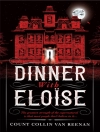In ‘Hauntings, ‘ Vernon Lee offers a sophisticated exploration of supernatural themes through a collection of essays and short stories that intertwine philosophy, aesthetics, and Gothic elements. This work showcases Lee’s unique literary style, characterized by lush, evocative prose and intricate psychological insights that delve into the human psyche. Set against a backdrop of turn-of-the-century Europe, ‘Hauntings’ examines the intersections of art and experience, probing the boundaries of reality and the spectral dimensions of existence. Lee’s deft use of narrative and her keen perception of the uncanny contribute to the rich tapestry of this volume, celebrating the intricate relationship between fear and beauty. Vernon Lee, born Violet paget, was a pioneering intellectual and a key figure in the fin-de-siècle movement, often associated with aestheticism. Her extensive travels and scholarly pursuits in philosophy and art heavily influenced her writing. A close acquaintance with prominent figures such as Oscar Wilde and Henry James further shaped her views on aesthetics and the supernatural, serving as a catalyst for the themes explored in ‘Hauntings.’ Lee’s unconventional approach to gender roles and her fascination with the uncanny also reflect her position as a progressive thinker in a conservative society. For readers captivated by the interplay of art, emotion, and the supernatural, ‘Hauntings’ presents an exquisite amalgamation of these elements. Vernon Lee’s adept storytelling and philosophical insights invite readers to engage with the hauntingly beautiful, making this work an essential read for those interested in Gothic literature, aesthetics, and the art of the uncanny. Prepare to be enchanted, challenged, and ultimately transformed by the spectral journeys found within these pages.
关于作者
Vernon Lee, the pen name of Violet Paget (1856–1935), was an acclaimed British author known for her contributions to supernatural fiction, aesthetics, and travel narratives. Born to expatriate parents in France, Lee spent most of her life in Italy, absorbing the culture and history that would deeply influence her writing. ‘Hauntings’ (1890), one of her renowned works, is a collection of tales that delve into the eerie and spectral, showcasing her masterful use of psychological horror and the uncanny. An intellectual figure of her time, Lee’s work transcended mere ghost stories; she deftly intertwined her narratives with commentaries on society, art, and philosophy, blending gothic elements with poignant social critiques. Her literary style is characterized by a sophisticated and erudite tone, often reflective of her extensive knowledge and learnings in art history and music, which informed her aesthetic theories and critique of the fin de siècle. Lee never confined herself to fiction; her essays and studies, including ‘Euphorion’ (1884), ‘Baldwin’ (1886), and ‘The Beautiful: An Introduction to Psychological Aesthetics’ (1913), contributed significantly to Victorian intellectual discourse. Her work remained influential within literary circles and is still recognized for challenging the norms of her era through both her literary pursuits and her questioning of gender roles within society.












